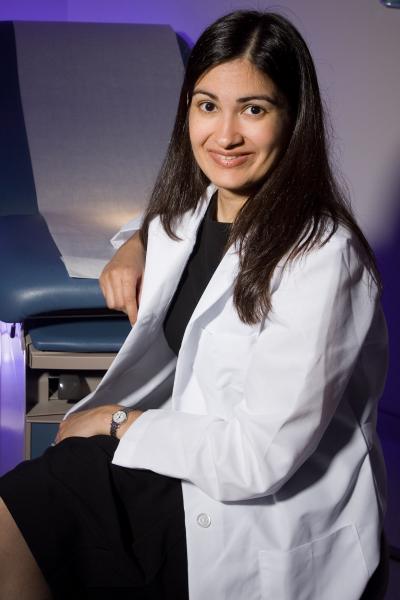Unemployment common after breast cancer treatment

This is Reshma Jagsi, M.D., D.Phil Credit: University of Michigan Health System
Nearly one-third of breast cancer survivors who were working when they began treatment were unemployed four years later. Women who received chemotherapy were most affected, according to a new study from the University of Michigan Comprehensive Cancer Center.
Researchers surveyed woman in Detroit and Los Angeles who had been diagnosed with early stage breast cancer. They narrowed their sample to the 746 women who reported working at the time they were diagnosed. Participants were surveyed about nine months after diagnosis, and then given a follow-up survey about four years later.
Overall, 30 percent of these working women said they were no longer working at the time of the four-year follow-up survey. Women who received chemotherapy were more likely to report that they were not working four years later.
Many of these women reported that they want to work: 55 percent of those not working said it was important for them to work and 39 percent said they were actively looking for work. Those who were not working were significantly more likely to report they were worse off financially. Results of the study appear in the journal Cancer.
“Many doctors believe that even though patients may miss work during treatment, they will 'bounce back' in the longer term. The results of this study suggest otherwise. Loss of employment is a possible long-term negative consequence of chemotherapy that may not have been fully appreciated to date,” says lead study author Reshma Jagsi, M.D., D.Phil., associate professor of radiation oncology at the University of Michigan Medical School.
Many patients take time off of work during chemotherapy treatment to deal with the immediate side effects of the therapy. The researchers say it's possible this may lead to long-term employment problems. In addition, chemotherapy treatments can cause long-term side effects such as neuropathy or cognitive issues, which might also affect job prospects.
The findings point to the need to reduce the burden of breast cancer treatment, and reinforce current efforts to develop better strategies for identifying patients less likely to benefit from chemotherapy.
Breast cancer statistics: 235,030 Americans will be diagnosed with breast cancer this year and 40,430 will die from the disease, according to the American Cancer Society
Additional authors: Sarah T. Hawley, Ph.D.; Paul Abrahamse, M.A.; Yun Li, Ph.D.; Nancy K. Janz, Ph.D.; Jennifer J. Griggs, M.D., M.P.H.; Steven Katz, M.D., M.P.H., all from the University of Michigan; Cathy Bradley, Ph.D., from Virginia Commonwealth University; John J. Graff, Ph.D., Cancer Institute of New Jersey; Ann Hamilton, Ph.D., University of Southern California
Funding: National Cancer Institute grants R01 CA109696, R01 CA088370, K05 CA 111340; American Cancer Society
Disclosure: None
Reference: Cancer, published online April 28, 2014
Resources:
U-M Cancer AnswerLine, 800-865-1125
U-M Comprehensive Cancer Center, http://www.mcancer.org
Clinical trials at U-M, http://www.mcancer.org/clinicaltrials
mCancerTalk blog, http://uofmhealthblogs.org/cancer
Media Contact
All latest news from the category: Studies and Analyses
innovations-report maintains a wealth of in-depth studies and analyses from a variety of subject areas including business and finance, medicine and pharmacology, ecology and the environment, energy, communications and media, transportation, work, family and leisure.
Newest articles

Properties of new materials for microchips
… can now be measured well. Reseachers of Delft University of Technology demonstrated measuring performance properties of ultrathin silicon membranes. Making ever smaller and more powerful chips requires new ultrathin…

Floating solar’s potential
… to support sustainable development by addressing climate, water, and energy goals holistically. A new study published this week in Nature Energy raises the potential for floating solar photovoltaics (FPV)…

Skyrmions move at record speeds
… a step towards the computing of the future. An international research team led by scientists from the CNRS1 has discovered that the magnetic nanobubbles2 known as skyrmions can be…





















